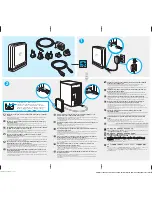
Using SNMP
ExtremeWare 7.2e Installation and User Guide
53
Accessing Switch Agents
To have access to the SNMP agent residing in the switch, at least one VLAN must have an IP address
assigned to it.
By default, SNMP access and SNMPv1/v2c traps are enabled. SNMP access and SNMP traps can be
disabled and enabled independently—you can disable SNMP access but still allow SNMP traps to be
sent, or vice versa.
Supported MIBs
In addition to private MIBs, the switch supports the standard MIBs listed in Appendix A.
NOTE
The SNMP ifAdminStatus MIB value is not saved after a reboot. Ports set to down in the SNMP
ifAdminStatus MIB come back after rebooting. However, if you save the configuration using the CLI or
SNMP after changing the port status to down in the ifAdminStatus MIB, then the change is saved after
a reboot.
Configuring SNMPv1/v2c Settings
The following SNMPv1/v2c parameters can be configured on the switch:
• Authorized trap receivers
—An authorized trap receiver can be one or more network management
stations on your network. The switch sends SNMPv1/v2c traps to all trap receivers. You can have a
maximum of 16 trap receivers configured for each switch, and you can specify a community string
and UDP port for individually for each trap receiver. All community strings must also be added to
the switch using the
configure snmp add community
command.
To configure a trap receiver on a switch, use the following command:
configure snmp add trapreceiver <ip address> {port <number>} community {hex}
<community string> {from <source ip address>} {mode [enhanced | standard]}
trap-group {auth-traps{,}} {extreme-traps{,}} {link-up-down-traps{,}}
{ospf-traps{,} {ping-traceroute-traps{,}} {rmon-traps{,}} {security-traps{,}}
{smart-traps{,}} {stp-traps{,}} {system-traps{,}} {vrrp-traps{,}}
See the Command Reference for a listing of the available traps.
You can delete a trap receiver using the
configure snmp delete trapreceiver
command.
Entries in the trap receiver list can also be created, modified, and deleted using the RMON2
trapDestTable MIB variable, as described in RFC 2021.
• SNMP read access
—The ability to read SNMP information can be restricted through the use of an
access profile. An access profile permits or denies a named list of IP addresses and subnet masks.
To configure SNMPv1/v2c read access to use an access profile, use the following command:
configure snmp access-profile readonly [<access-profile> | none]
Use the
none
option to remove a previously configured access profile.
• SNMP read/write access
—The ability to read and write SNMP information can be restricted through
the use of an access profile. An access profile permits or denies a named list of IP addresses and
subnet masks.
To configure SNMPv1/v2c read/write access to use an access profile, use the following command:
configure snmp access-profile readwrite [<access-profile> | none]
Summary of Contents for ExtremeWare 7.2e
Page 14: ...14 ExtremeWare 7 2 0 Software User Guide Contents...
Page 18: ...18 ExtremeWare 7 2e Installation and User Guide Preface...
Page 80: ...80 ExtremeWare 7 2e Installation and User Guide Accessing the Switch...
Page 102: ...102 ExtremeWare 7 2e Installation and User Guide Virtual LANs VLANs...
Page 108: ...108 ExtremeWare 7 2e Installation and User Guide Forwarding Database FDB...
Page 180: ...180 ExtremeWare 7 2e Installation and User Guide Security...
Page 194: ...194 ExtremeWare 7 2e Installation and User Guide Ethernet Automatic Protection Switching...
Page 218: ...218 ExtremeWare 7 2e Installation and User Guide Spanning Tree Protocol STP...
Page 248: ...248 ExtremeWare 7 2e Installation and User Guide Interior Gateway Protocols...
Page 256: ...256 ExtremeWare 7 2e Installation and User Guide IP Multicast Routing...
Page 308: ...308 ExtremeWare 7 2e Installation and User Guide Using ExtremeWare Vista on the Summit 400...
Page 316: ...316 ExtremeWare 7 2e Installation and User Guide Technical Specifications...
Page 324: ...324 ExtremeWare 7 2e Installation and User Guide Software Upgrade and Boot Options...
















































